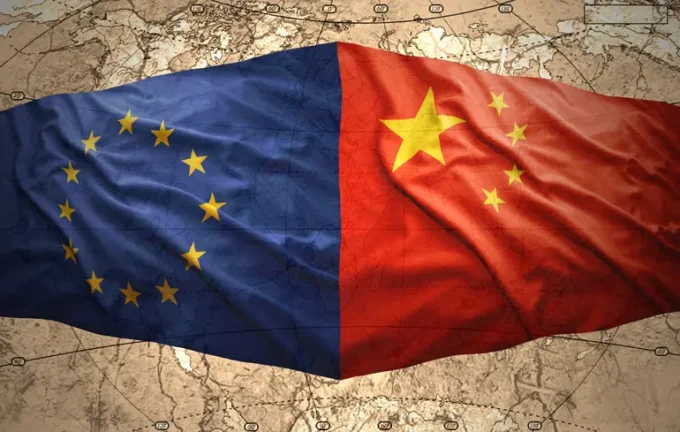EU-China Summit: Tensions and Strategic Uncertainties in the Center of Global Affairs

This week, the anticipated yet tense gathering of European Union officials and Chinese leadership is set to take place in Beijing, marking a critical juncture in shaping the future direction of bilateral relations amid escalating global challenges.
The core discussions are expected to revolve around complex negotiations fuelled by trade tensions and differing stances on political support for Russia’s war against Ukraine.
Beijing aims to portray this summit as a significant step toward multi-polarity in the international system, emphasizing the partnership between two major civilizations and markets that champion globalization and cultural diversity.
Conversely, Brussels expresses concern over China’s rapidly growing trade surplus and its potential role in supplying dual-use goods that could be used militarily by Russia.
Fears are mounting regarding Europe’s increasing economic dependence on China and Beijing’s possible leverage in shifting global power balances.
Last month, Belgium already declined to participate in a scheduled meeting with Chinese representatives, signaling diplomatic strain.
Leaders from the EU, including top diplomat Charles Kallas and President Ursula von der Leyen, are expected to meet with President Xi Jinping during a one-day visit to Beijing, which will include a summit and working lunches with Premier Li Qiang.
China positions this trip as a symbol of the importance it places on bilateral ties and its desire to build a multipolar world through cooperation with Europe, highlighting the roles of their two primary global markets and civilizations.
However, Xi Jinping’s refusal to attend the previously planned EU summit in Brussels has raised concerns about mutual trust and commitment.
Meanwhile, Brussels also canceled an important economic forum with Chinese officials last month, reflecting rising tensions in trade.
European officials are troubled by China’s trade imbalance—whose record high total exceeds €400 billion—and by criticism of Chinese manufacturers flooding European markets with cheap goods.
Over the past year, the EU has launched more than 25 investigations into trading practices with China.
Beijing’s refusal to condemn Russia’s full-scale invasion of Ukraine further deepens mistrust.
According to sources, Chinese Foreign Minister Wang Yi stated that China does not want Russia to lose because a defeat would allow the US to shift focus onto China and Asia, surprising EU officials who previously saw Beijing as neutral.
Furthermore, up to 80% of dual-use goods for Russia pass through China, which EU officials find problematic.
Just days ahead of the summit, the EU imposed sanctions on two small Chinese banks involved in trade with Russia, prompting Beijing to threaten retaliatory measures.
Nonetheless, tensions remain controlled, primarily centered around tariffs negotiations with the US, with whom both sides are eager to finalize trade agreements by the end of the month.
China has also expressed cautious responses to EU trade restrictions, including tariffs on electric vehicles and restrictions on semiconductor equipment, attempting to avoid full-scale confrontation.
Diplomats from Brussels continue efforts to find common ground with Beijing regarding climate commitments that could lead to joint statements during the summit.
Brussels insists that China must commit to more ambitious emission reduction targets to agree on joint declarations.
Meanwhile, von der Leyen’s firm stance toward China does not preclude her from seeking a balanced approach, avoiding open conflict while protecting EU interests.
Experts warn that the ongoing trade and geopolitical conflicts are escalating tensions globally, with China wielding increasing influence on the international stage.
Observers see this summit as a pivotal moment in defining Europe’s strategy—balancing cooperation with assertiveness—as the world witnesses profound changes in the international order.

